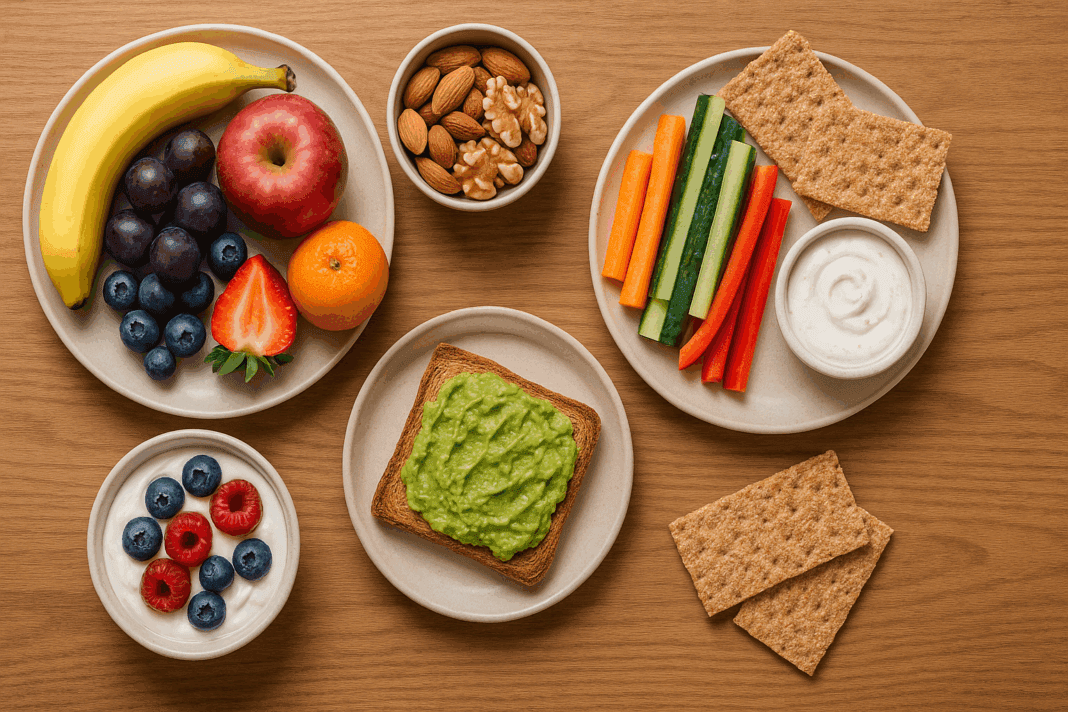Snacking has evolved from being viewed as an unhealthy indulgence to becoming a cornerstone of strategic nutrition. For adults navigating busy schedules, balancing work, exercise, and wellness goals, snacks can play a crucial role in maintaining energy levels, preventing overeating, and supporting metabolic health. However, not all snacks are created equal. The rise of processed foods has saturated the market with high-sugar, high-sodium options that may satisfy temporary cravings but do little for long-term well-being. That’s why curating easy and healthy snack ideas rooted in nutrition science is not just a trend—it’s an essential health strategy.
When done correctly, snacking can reinforce dietary goals and provide vital nutrients often missing from traditional meals. From brain-boosting fats to fiber-rich crunch, healthy snack ideas for adults serve as powerful tools in promoting cognitive health, cardiovascular support, weight management, and sustained energy. In this comprehensive article, we’ll explore how to snack smarter—without sacrificing flavor or convenience—while focusing on evidence-based insights into how healthy snack choices improve overall wellness. Whether you’re seeking healthy lunch snacks to bridge afternoon hunger or nourishing bites to support a heart-smart diet, this guide is your go-to resource.
You may also like: Delicious Meets Nutritious: How to Create Healthy Food with Flavor Using Expert-Backed Diet Recipes and Cooking Tips

Rethinking Snacking: A Wellness-Centered Perspective
The notion that snacking inherently disrupts a healthy diet is outdated. In fact, when integrated thoughtfully, snacking can contribute to nutritional adequacy, appetite control, and metabolic regulation. Easy and healthy snack ideas can help prevent blood sugar crashes and maintain cognitive alertness throughout the day. For individuals managing conditions like insulin resistance, diabetes, or even adrenal fatigue, regular nutrient-dense snacks may assist in stabilizing energy and hormone levels.
Adults often overlook snacks as opportunities to support wellness goals. Instead of defaulting to vending machine fare or sugary granola bars, intentional planning of healthy snack ideas allows individuals to meet their daily needs for fiber, protein, vitamins, and minerals. A snack can serve as a miniature meal that balances macronutrients and bridges the gap between breakfast and lunch or lunch and dinner. It’s not about grazing aimlessly but fueling purposefully.
Moreover, the act of mindful snacking—consciously choosing foods that nourish—can reinforce positive behaviors and curb emotional or stress-driven eating. When snacks are satisfying both nutritionally and sensorially, they can increase overall dietary adherence. For adults seeking to enhance wellness without overhauling their entire lifestyle, focusing on smart snacking is a simple yet profoundly effective step.
What Makes a Snack Healthy? Nutritional Guidelines to Follow
The healthiest snacks strike a balance between satiety and nutrition. A well-structured snack typically includes a combination of fiber-rich carbohydrates, lean or plant-based protein, and heart-healthy fats. These components slow digestion, provide steady energy, and offer lasting fullness. For instance, pairing a slice of whole-grain toast with avocado and a sprinkle of chia seeds delivers fiber, healthy fat, and omega-3s in one easy bite.
Avoiding ultra-processed foods is another core principle. While convenience is important, many packaged snacks are laden with added sugars, refined grains, and artificial preservatives. Instead, prioritize whole foods—fresh fruit, raw nuts, plain yogurt, or roasted vegetables—that deliver vitamins, antioxidants, and phytonutrients that processed options lack. Even when selecting packaged options, look for minimal ingredients and added nutrients such as iron, calcium, or probiotics.
Portion size matters as much as content. Many seemingly “healthy” snacks become counterproductive when consumed in excess. Nuts, for instance, are a wonderful source of healthy fats, but a small handful—about an ounce—is usually sufficient. Likewise, dried fruits can offer concentrated nutrients but are also high in natural sugars. Knowing what to eat and how much is key to maintaining nutritional balance without turning a snack into an unintended meal.
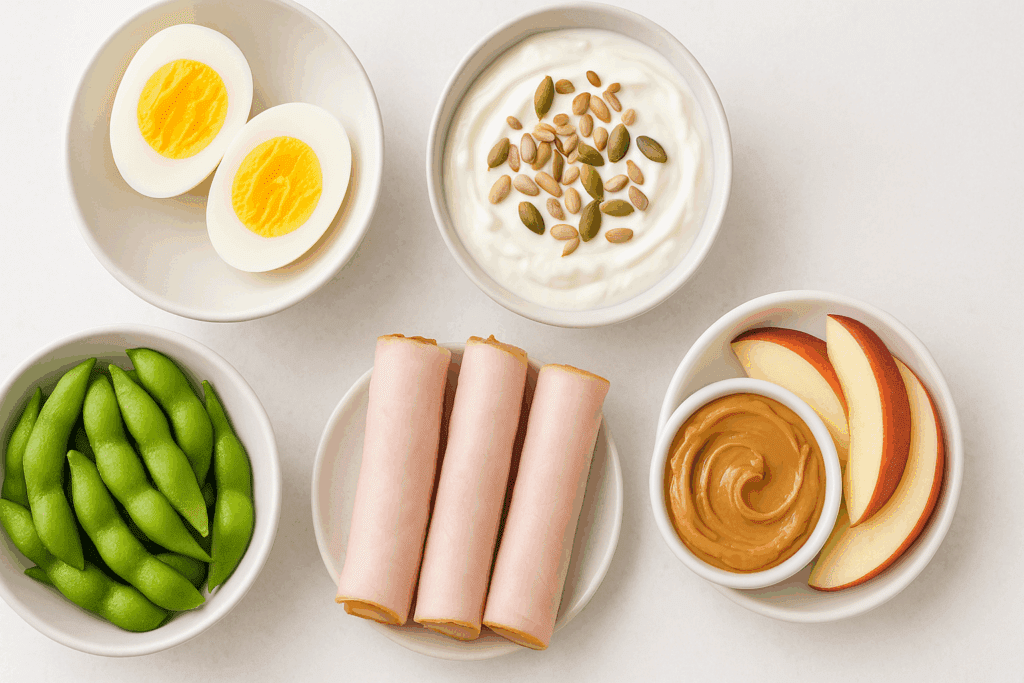
Protein-Rich Snacks to Build Strength and Control Hunger
Protein isn’t just for bodybuilders—it’s essential for everyone. Incorporating protein into snacks helps stabilize blood sugar levels, reduce cravings, and preserve lean muscle mass. For adults aiming to manage weight or maintain metabolic health, protein-rich snacks are an effective tool. Greek yogurt, cottage cheese, boiled eggs, tuna salad, and turkey roll-ups are excellent sources of complete protein.
Plant-based options such as roasted chickpeas, edamame, or nut butter spread on apple slices also provide ample protein alongside fiber and antioxidants. These easy and healthy snack ideas work particularly well for those following vegetarian or vegan diets, as they offer plant-sourced amino acids with added anti-inflammatory benefits.
For healthy lunch snacks, consider lentil-based soups or quinoa bowls paired with avocado and seeds. These options provide slow-digesting proteins that support cognitive performance during long workdays. The strategic integration of protein in snacks not only satisfies but also supports physiological functions like hormone regulation, immune defense, and tissue repair.
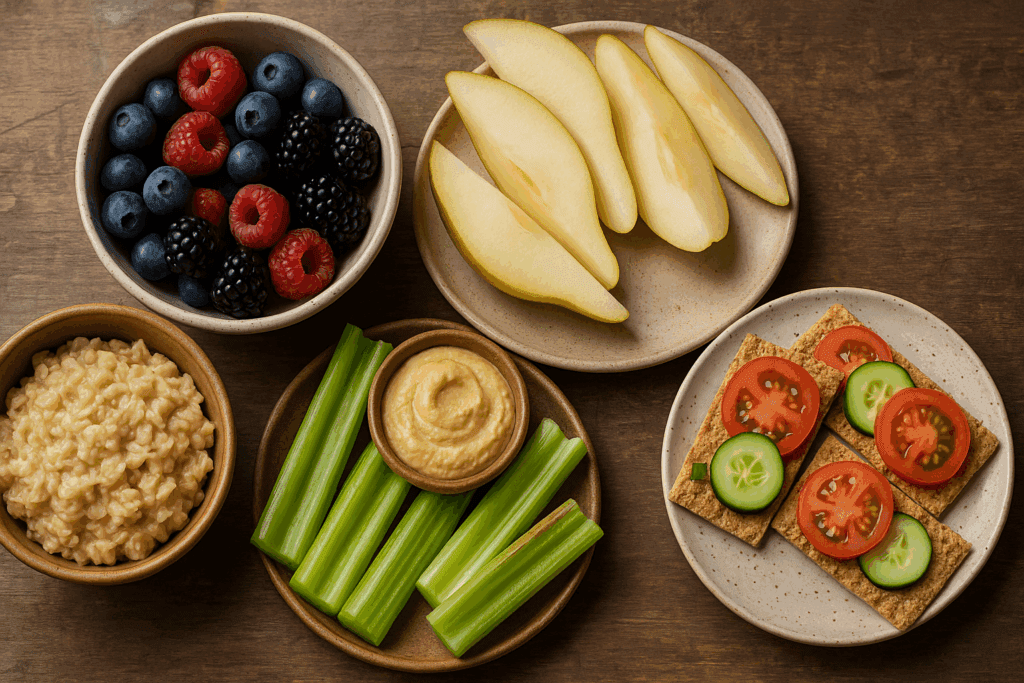
Fiber-Fueled Snacking for Digestive and Cardiovascular Health
Fiber is an unsung hero in adult nutrition, playing a key role in digestive function, cardiovascular health, and blood sugar control. Most adults fall short of the recommended 25–30 grams of fiber per day, making snacks an ideal opportunity to bridge the gap. Whole fruits like pears and berries, raw vegetables like carrots or celery, and whole grains such as oatmeal or brown rice cakes are all rich in dietary fiber.
Fiber adds bulk to food, which promotes satiety and reduces the likelihood of overeating at meals. It also slows glucose absorption, making fiber-rich snacks a smart choice for managing blood sugar levels and supporting insulin sensitivity. Moreover, soluble fiber—found in foods like oats and flaxseeds—can help lower LDL cholesterol, contributing to heart health.
Easy and healthy snack ideas like trail mix with pumpkin seeds and dried figs or hummus with raw bell pepper slices provide both fiber and micronutrients. Incorporating these into your weekly meal plan ensures better digestion, reduces bloating, and supports long-term wellness. Healthy snack ideas for adults aren’t just about preventing hunger—they can actively contribute to disease prevention when fiber is prioritized.
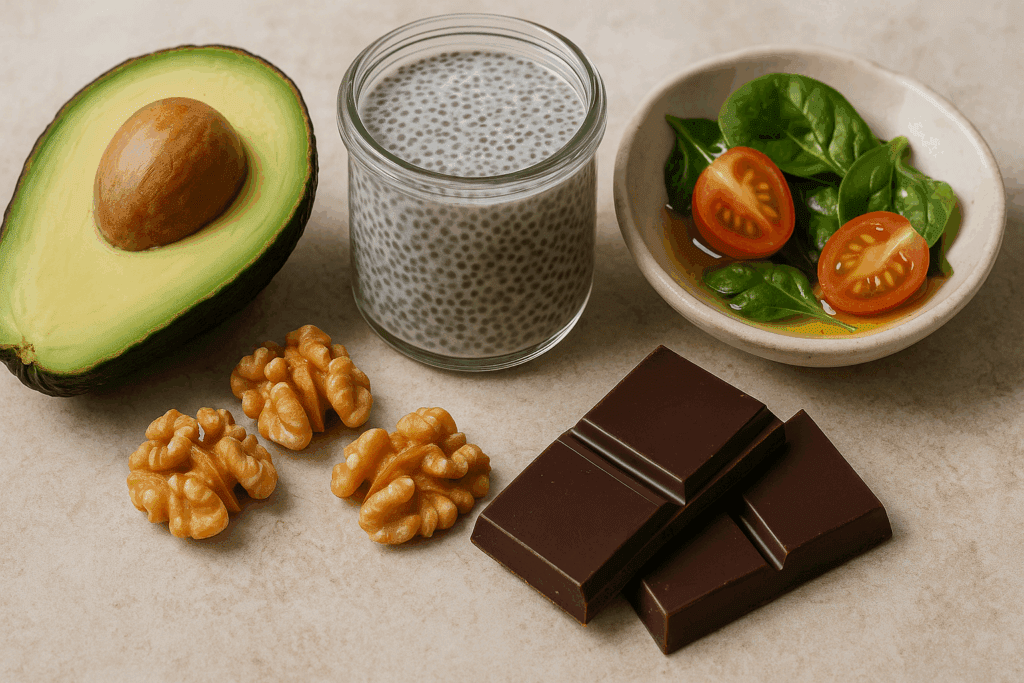
Healthy Fats: Supporting Brain Function and Hormonal Balance
Fat has long been misunderstood in nutrition discourse. While trans fats and excess saturated fat should be minimized, unsaturated fats—particularly monounsaturated and polyunsaturated types—play an essential role in adult health. Omega-3 fatty acids, for example, are linked to reduced inflammation, better cognitive function, and lower cardiovascular risk.
Snacking on foods rich in healthy fats, such as walnuts, almonds, flaxseed crackers, or avocado, offers not only satiety but also cellular nourishment. Avocado toast on whole grain bread, a chia pudding made with almond milk, or a small portion of dark chocolate with pistachios are all delicious and nutrient-dense options.
Healthy lunch snacks that feature fats—like salmon wraps or Mediterranean-style bowls with olive oil dressing—keep you full longer and enhance nutrient absorption. Vitamins A, D, E, and K are all fat-soluble, meaning your body needs dietary fat to utilize them effectively. Healthy snack ideas that include quality fats contribute to cognitive clarity, hormone regulation, and skin health, making them indispensable in a well-rounded diet.
Carbohydrates That Work for You: Choosing the Right Types
Carbohydrates often get a bad rap, but they are vital to human function when chosen wisely. The key is selecting complex carbohydrates that digest slowly and provide vitamins, minerals, and fiber. Whole grains, legumes, fruits, and starchy vegetables fall into this category, offering steady energy without spiking blood sugar.
Smart carbohydrate-based snacks include oatmeal with fresh fruit, whole-grain pita with hummus, or banana slices with a light drizzle of nut butter. These easy and healthy snack ideas satisfy hunger and deliver important nutrients such as magnesium, potassium, and B vitamins, which are essential for energy metabolism.
Healthy lunch snacks that rely on wholesome carbs—like a black bean and sweet potato burrito or a barley and roasted veggie salad—keep energy levels stable during demanding afternoons. Rather than fearing carbs, adults should focus on choosing high-quality sources that work with their bodies, not against them. Properly selected carbohydrates support mood, cognition, and physical performance in everyday life.
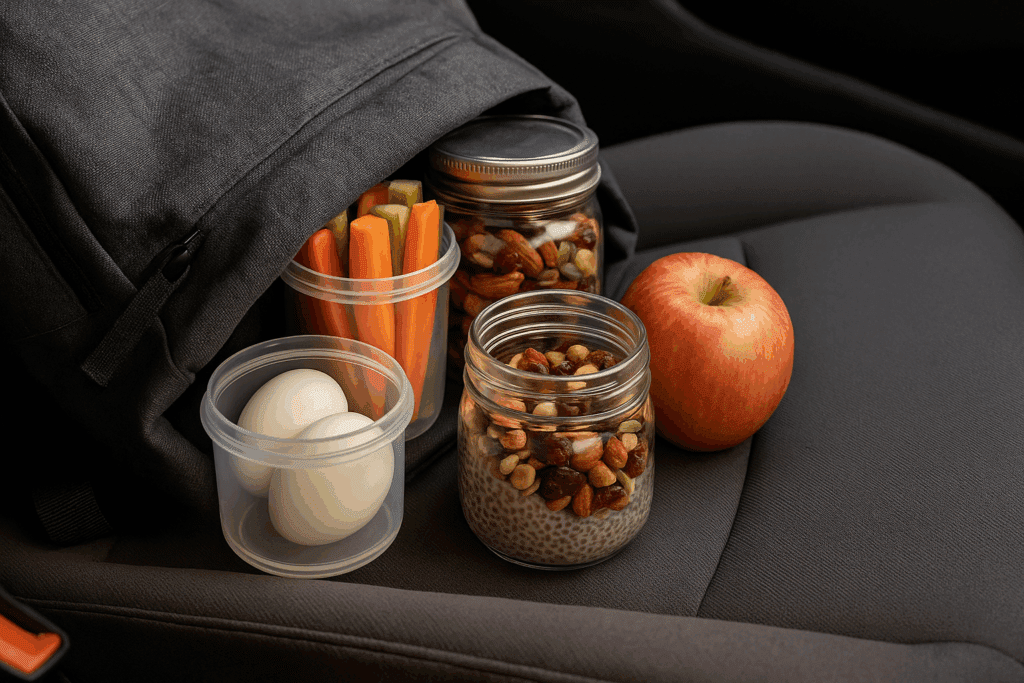
On-the-Go Healthy Snack Ideas for Busy Lifestyles
One of the most common barriers to healthy snacking is time. Busy adults often resort to convenience foods that sacrifice nutrition for portability. Fortunately, there are plenty of healthy snack ideas for adults that are both grab-and-go friendly and rich in nutrients. Pre-packaged trail mix (with minimal added sugar), cheese sticks, hard-boiled eggs, and hummus cups with baby carrots are all excellent choices that require minimal prep.
Meal prepping one or two snack options for the week can make a huge difference in consistency. Overnight oats, chia seed pudding, or baked veggie muffins are perfect to grab on the way out the door. These options can also double as healthy lunch snacks when paired with a protein source or fruit.
Keeping healthy snack ideas easy doesn’t mean compromising on nutrition. With a bit of planning, even the busiest professionals can maintain their energy and avoid mid-day slumps or fast-food temptation. Convenience and wellness don’t have to be mutually exclusive when you know what to look for.
Mindful Eating: Turning Snacks into Moments of Wellness
Snacking isn’t just a physical act—it’s also psychological. Mindful eating turns the simple act of snacking into a practice of presence and self-care. Rather than eating in front of a screen or while multitasking, taking a few moments to enjoy a snack without distraction enhances satiety and improves digestion.
This practice also helps people distinguish between actual hunger and emotional eating triggers. When adults choose healthy snack ideas that satisfy both nutritionally and emotionally—such as a warm bowl of cinnamon-spiced apples or a small cup of herbal tea with dark chocolate—they are less likely to overeat later.
Healthy lunch snacks can be part of this ritual too. Taking even 10 minutes to pause and nourish the body with intention can shift the mindset from “eating on the go” to “refueling with purpose.” In doing so, snacks become more than sustenance—they become an act of self-care and a step toward holistic wellness.
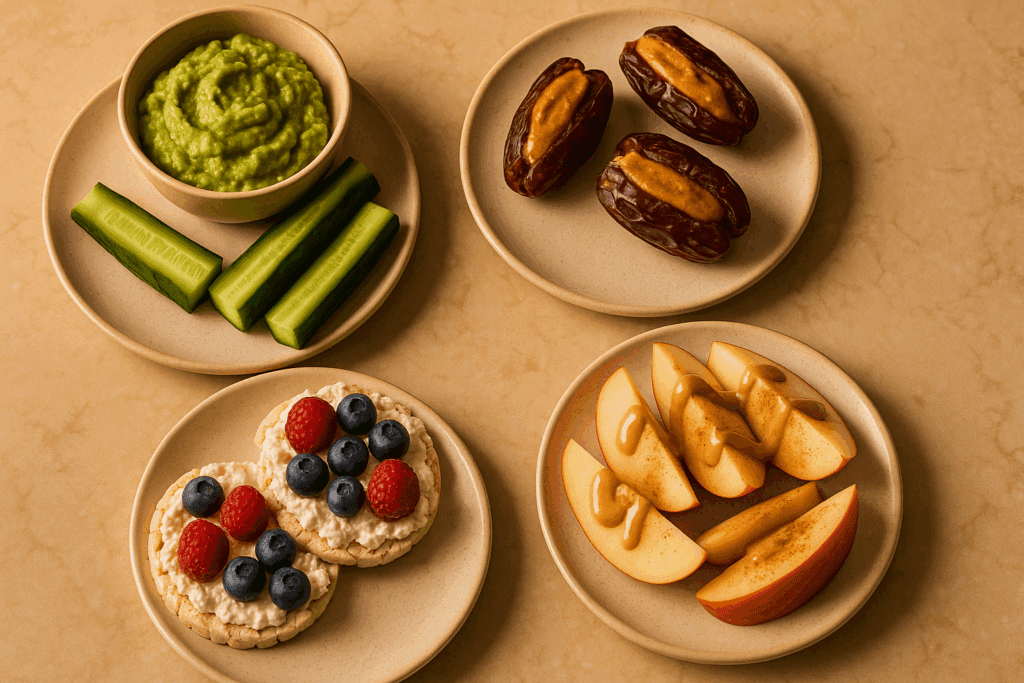
Refreshing and Creative Snack Pairings to Try Today
Innovation in snacking doesn’t require a gourmet kitchen. A little creativity can turn ordinary ingredients into satisfying combinations that hit every nutritional note. Try pairing sliced cucumbers with guacamole for a hydrating and satiating bite, or dip dates into almond butter for a sweet-and-savory treat rich in fiber and healthy fats.
Layer rice cakes with ricotta cheese and fresh berries, or enjoy apple wedges with tahini and a sprinkle of cinnamon. These easy and healthy snack ideas are simple enough to whip up in under five minutes yet pack powerful nutritional benefits. They also make excellent healthy lunch snacks when paired with a boiled egg or a few slices of lean turkey.
When variety is introduced into healthy snack ideas for adults, adherence increases, and boredom decreases. Mixing up textures and flavors not only keeps things interesting but also diversifies the nutrients you consume. Ultimately, flavor, nutrition, and ease can—and should—coexist in your snacking strategy.
Frequently Asked Questions (FAQ): Easy and Healthy Snack Ideas for Adults That Support Better Nutrition and Wellness
1. How can healthy snack ideas improve productivity during long workdays?
Healthy snack ideas for adults can significantly enhance productivity by stabilizing blood glucose levels and preventing the mental fatigue that often follows energy crashes. When the brain is properly fueled—especially with snacks that combine complex carbs, protein, and healthy fats—cognitive performance, memory, and focus all improve. Choosing easy and healthy snack ideas like a whole-grain wrap with turkey or Greek yogurt with flaxseed can prevent afternoon slumps and keep you sharp. Beyond physical nourishment, snacks that involve a small preparation ritual, such as slicing fruit or layering rice cakes, can offer a brief mental reset, reducing burnout and promoting mindfulness. Incorporating healthy lunch snacks into your midday routine not only optimizes nutrition but can also provide a structured pause that refreshes the mind.
2. Are there cultural or regional variations in healthy snack ideas that might inspire more variety?
Absolutely—exploring healthy snack ideas through an international lens can add exciting variety and expand your nutrient profile. For example, Japanese adults often enjoy onigiri (rice balls with seaweed and fish), which are low in fat and high in complex carbohydrates and omega-3s. Mediterranean countries commonly favor snacks like olives, hummus, and whole-grain pita, which support heart health and satiety. Latin American traditions include snacks such as grilled plantains or sliced jicama with lime and chili, offering fiber and antioxidants. Incorporating global easy and healthy snack ideas helps diversify flavors and introduces novel combinations that may become favorite go-to options, particularly for adults seeking culturally inspired, healthy lunch snacks.
3. What psychological benefits can result from using healthy snack ideas in a structured meal plan?
The act of planning and consuming healthy snack ideas can provide a sense of agency and control, particularly for adults managing anxiety, stress, or disordered eating patterns. Structuring easy and healthy snack ideas throughout the day supports emotional stability by avoiding blood sugar fluctuations that can trigger mood swings. Additionally, the consistency of nourishing snack habits may reduce decision fatigue and food guilt, often linked to impulsive or convenience-based eating. Over time, the routine of preparing healthy snack ideas for adults reinforces self-care behaviors that support long-term wellness and mental clarity. This psychological anchoring can turn a simple midday bite into a powerful ritual of mindfulness and resilience.
4. Can healthy snack ideas support intermittent fasting protocols?
Yes, healthy snack ideas can still align with intermittent fasting (IF) when planned within your designated eating window. For adults practicing time-restricted eating, it’s essential to maximize nutrient density during the hours when food is allowed. Easy and healthy snack ideas that combine quality protein with fiber and unsaturated fats—such as almond-stuffed dates or a protein smoothie with greens—help sustain energy during non-fasting periods and support muscle maintenance. For those using IF to manage weight or metabolic syndrome, healthy snack ideas for adults can help meet nutritional needs without breaking fasting goals. It’s also worth noting that fasting protocols vary, so personalized strategies should consider overall health conditions and activity levels.
5. How can healthy snack ideas help support hormone balance in adults?
Hormonal health is deeply influenced by nutrition, and the right healthy snack ideas can play a key role in maintaining hormonal balance. Nutrients like magnesium, vitamin B6, and omega-3 fatty acids—found in snacks such as pumpkin seeds, dark leafy greens, and walnuts—are essential for regulating cortisol, insulin, and reproductive hormones. Easy and healthy snack ideas that include adaptogenic herbs like maca or ashwagandha, when added to smoothies or energy bites, may further support adrenal function and stress regulation. For adults navigating perimenopause, andropause, or thyroid challenges, spacing meals with balanced, nutrient-rich snacks can help prevent blood sugar spikes and crashes that disrupt hormone rhythms. Integrating healthy lunch snacks with functional ingredients provides not just satiety, but therapeutic support for endocrine wellness.
6. What are some innovative storage solutions for keeping healthy snack ideas fresh and portable?
Portability is essential for adults who rely on healthy lunch snacks during busy workdays or travel. Silicone bento boxes, insulated snack thermoses, and reusable beeswax wraps are eco-friendly tools that preserve freshness without compromising convenience. For easy and healthy snack ideas like chia pudding or sliced vegetables with dip, mason jars with compartmentalized lids offer both portability and portion control. Shelf-stable options like homemade trail mix or roasted chickpeas can be stored in glass jars or airtight pouches for extended freshness. Creating a dedicated “snack drawer” at work or in your car stocked with healthy snack ideas for adults ensures that nourishment is always within reach, reducing the temptation to default to ultra-processed options.
7. How can parents model healthy snack habits to their teenagers and young adults?
Adults who demonstrate consistent use of healthy snack ideas can influence their children’s long-term eating patterns in powerful ways. Preparing easy and healthy snack ideas together—such as homemade energy bites, veggie wraps, or fruit parfaits—fosters not only skills development but also positive associations with whole foods. Involving teens in planning and shopping for healthy lunch snacks gives them ownership of their choices while reinforcing nutritional literacy. Discussing the “why” behind snack ingredients—like the brain-boosting benefits of walnuts or the digestive perks of yogurt—turns mealtimes into teachable moments. By modeling healthy snack ideas for adults in real-time, parents plant seeds for a lifetime of better choices and wellness awareness.
8. Can healthy snack ideas reduce inflammation and support joint health?
Yes, certain healthy snack ideas have anti-inflammatory properties that can support joint health and reduce chronic pain. Snacks rich in omega-3s, such as smoked salmon on whole-grain crackers or walnuts with dried cherries, help combat systemic inflammation. Turmeric-spiced roasted chickpeas or golden milk smoothies with almond butter offer bioactive compounds like curcumin, which are increasingly studied for their anti-inflammatory effects. Adults dealing with arthritis, autoimmune issues, or sports injuries may find relief by consistently choosing easy and healthy snack ideas that limit processed sugars and prioritize anti-inflammatory nutrients. Healthy lunch snacks with turmeric, ginger, or omega-3 sources can be an effective part of a holistic pain management strategy.
9. What are some effective ways to make healthy lunch snacks more exciting and sustainable over time?
Avoiding “snack fatigue” is essential for maintaining long-term engagement with healthy habits. Rotating ingredients, experimenting with international flavors, and leveraging seasonal produce can keep healthy lunch snacks both exciting and nourishing. For example, switch from hummus and carrots to a spicy black bean dip with jicama, or replace apple slices with grilled peaches and cinnamon yogurt in summer. Adults can also use theme-based approaches—like Mediterranean Mondays or Protein-Packed Fridays—to build novelty into their snacking routine. Batch-prepping easy and healthy snack ideas in creative formats, such as snack jars or DIY bento boxes, ensures both variety and efficiency. Keeping a digital or physical snack journal helps track preferences, prevents boredom, and supports adherence.
10. How might future trends and technologies influence the development of healthy snack ideas for adults?
The future of healthy snack ideas for adults is likely to be shaped by advancements in personalized nutrition, wearable tech, and sustainable food production. Smart devices that monitor blood glucose or metabolism may soon recommend specific easy and healthy snack ideas tailored to individual biometric feedback. Additionally, alternative protein sources such as algae, crickets, or lab-grown meats could become more mainstream, offering eco-friendly options for high-protein healthy lunch snacks. 3D food printing and AI-assisted meal planning may also allow for ultra-customized snack combinations based on precise nutritional gaps or health goals. As the food industry evolves, so too will our access to diverse and innovative healthy snack ideas, making wellness more accessible, tech-integrated, and exciting than ever.
Conclusion: Embracing Healthy Snacking as a Path to Wellness
Snacking is no longer a dietary vice to be avoided—it’s a valuable opportunity to reinforce health goals and infuse daily life with essential nutrition. By prioritizing easy and healthy snack ideas that include whole foods, balanced macronutrients, and satisfying flavors, adults can support everything from energy levels to heart health, digestion, and cognitive clarity.
Whether you’re preparing healthy lunch snacks for the office or assembling a post-workout bite at home, the key is to focus on quality, balance, and intention. From fiber-rich veggie pairings to protein-powered mini meals and smart carbohydrate combos, there is a wealth of healthy snack ideas for adults that are both convenient and nourishing.
Making snacks a regular, thoughtful part of your diet can transform your relationship with food. Instead of reacting to hunger, you become proactive—fueling your body with purpose and care. In doing so, you build a foundation for long-term wellness, one satisfying snack at a time.
Further Reading:
65 Healthy-Ish Work Snacks That’ll Give You That Friday Feeling (Even When It’s Only Wednesday)


